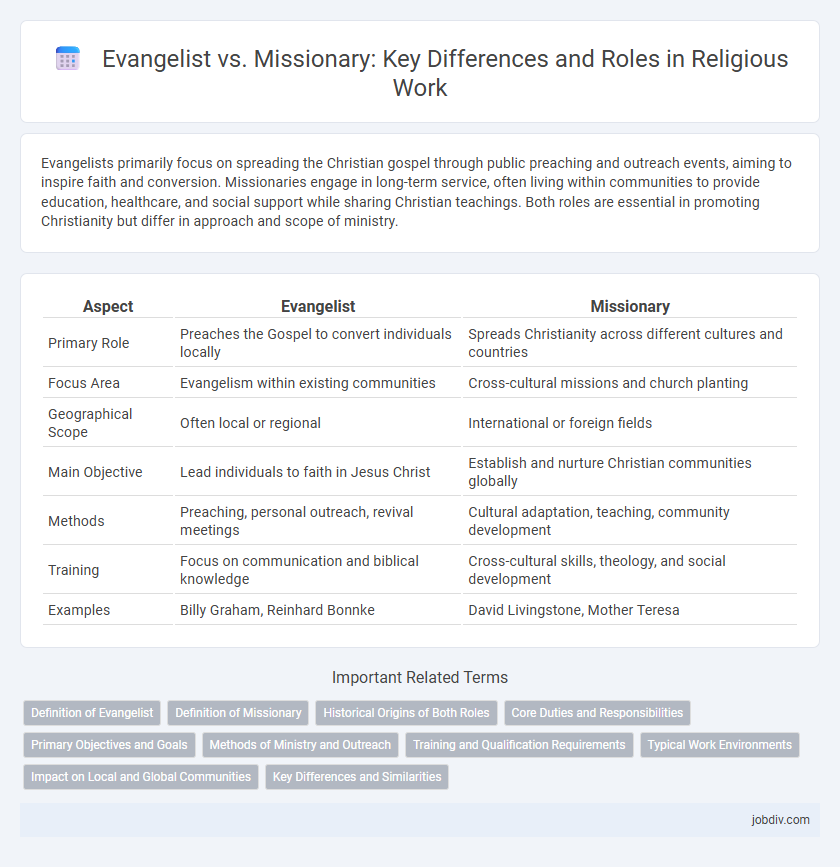Evangelists primarily focus on spreading the Christian gospel through public preaching and outreach events, aiming to inspire faith and conversion. Missionaries engage in long-term service, often living within communities to provide education, healthcare, and social support while sharing Christian teachings. Both roles are essential in promoting Christianity but differ in approach and scope of ministry.
Table of Comparison
| Aspect | Evangelist | Missionary |
|---|---|---|
| Primary Role | Preaches the Gospel to convert individuals locally | Spreads Christianity across different cultures and countries |
| Focus Area | Evangelism within existing communities | Cross-cultural missions and church planting |
| Geographical Scope | Often local or regional | International or foreign fields |
| Main Objective | Lead individuals to faith in Jesus Christ | Establish and nurture Christian communities globally |
| Methods | Preaching, personal outreach, revival meetings | Cultural adaptation, teaching, community development |
| Training | Focus on communication and biblical knowledge | Cross-cultural skills, theology, and social development |
| Examples | Billy Graham, Reinhard Bonnke | David Livingstone, Mother Teresa |
Definition of Evangelist
An evangelist is a person dedicated to preaching the gospel, emphasizing the message of salvation through Jesus Christ. Unlike missionaries, evangelists primarily focus on sharing the Christian faith within established communities rather than establishing new churches in foreign or unreached areas. Their role centers on spreading scripture teachings and inspiring spiritual growth through public preaching and personal testimony.
Definition of Missionary
A missionary is an individual dedicated to spreading their religious faith by traveling to different regions or countries to promote spiritual teachings and establish religious communities. Missionaries often engage in humanitarian work, education, and cultural exchange to support their mission and foster deeper connections. Their primary goal is to expand the reach of their faith and inspire conversion or renewed commitment among diverse populations.
Historical Origins of Both Roles
Evangelists trace their origins to the early Christian church, notably the apostle Paul, who spread the gospel through preaching and teaching within established communities. Missionaries emerged more distinctly during the Age of Exploration in the 15th and 16th centuries, tasked with traveling to foreign lands to convert indigenous populations and establish new churches. Both roles have roots in biblical mandates, but evangelists primarily focus on proclamation within existing contexts, while missionaries emphasize cross-cultural outreach and church planting.
Core Duties and Responsibilities
Evangelists primarily focus on proclaiming the gospel and converting individuals through preaching, public outreach, and personal testimonies. Missionaries undertake the responsibility of establishing and nurturing faith communities, often engaging in long-term cultural adaptation, education, and humanitarian work in diverse locations. Both roles emphasize spreading Christian teachings, but evangelists concentrate on immediate conversion efforts while missionaries commit to sustained community development and discipleship.
Primary Objectives and Goals
Evangelists primarily focus on proclaiming the gospel and converting individuals to Christianity, emphasizing personal salvation and spiritual renewal. Missionaries concentrate on establishing and nurturing faith communities through long-term discipleship, social development, and cultural integration. Both roles aim to expand Christian influence, but evangelists target immediate spiritual awakening, while missionaries pursue sustained growth and support in diverse contexts.
Methods of Ministry and Outreach
Evangelists primarily utilize preaching and public proclamation to share the Gospel, often engaging large crowds through sermons, media, and crusades. Missionaries focus on immersive, long-term community engagement, combining evangelism with social services such as education, healthcare, and cultural adaptation to contextualize their message. Both methods emphasize spreading Christian teachings, but evangelists prioritize immediate outreach, while missionaries invest in sustained relational ministry and cultural integration.
Training and Qualification Requirements
Evangelists typically undergo focused biblical training emphasizing preaching, interpretation, and communication skills tailored for local congregations, while missionaries require broader preparation including cultural immersion, language acquisition, and practical ministry skills to effectively serve cross-cultural contexts. Formal theological education, such as degrees from seminaries or Bible colleges, is common for both roles, yet missionaries often receive specialized training in anthropology and international relations. Certification and ordination standards vary by denomination but generally mandate demonstrated spiritual maturity and ministry competency for both evangelists and missionaries.
Typical Work Environments
Evangelists often work in dynamic settings such as churches, public gatherings, and media platforms to spread religious messages and inspire faith. Missionaries typically operate in diverse and sometimes remote locations, including foreign countries and underserved communities, where they provide both spiritual guidance and practical aid. Both roles require adaptability to varying cultural and social environments to effectively fulfill their religious missions.
Impact on Local and Global Communities
Evangelists primarily focus on spreading the Christian gospel within local communities, fostering spiritual growth and strengthening faith among congregations through preaching and personal outreach. Missionaries extend this impact globally by establishing churches, schools, and healthcare facilities, addressing both spiritual and tangible needs in diverse cultural contexts. Their combined efforts promote cross-cultural understanding and humanitarian development while expanding the reach of Christianity worldwide.
Key Differences and Similarities
Evangelists primarily focus on preaching the Gospel and converting individuals within established communities, emphasizing proclamation and outreach through sermons and media. Missionaries engage in broader work that includes evangelism but also involves community development, education, and humanitarian aid, often serving in cross-cultural or unreached areas. Both roles share the core objective of spreading Christian faith, but missionaries typically operate in more diverse, long-term contexts beyond direct evangelistic efforts.
Evangelist vs Missionary Infographic

 jobdiv.com
jobdiv.com